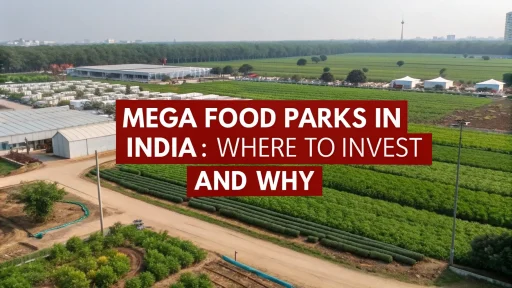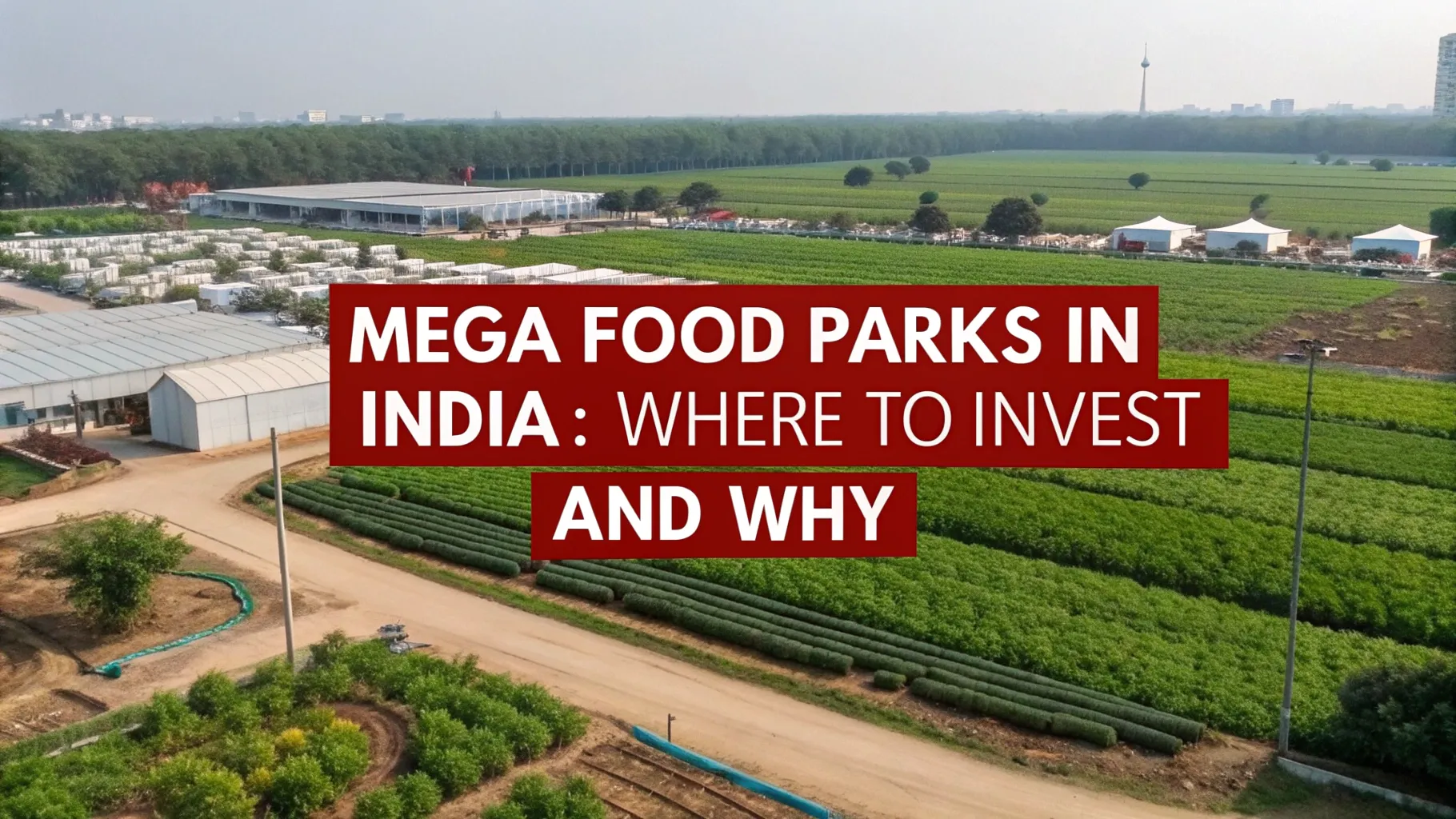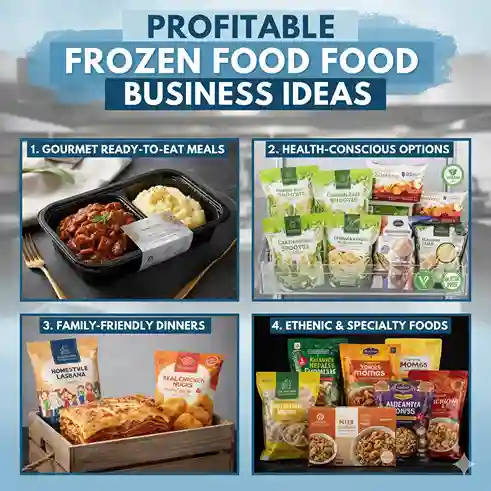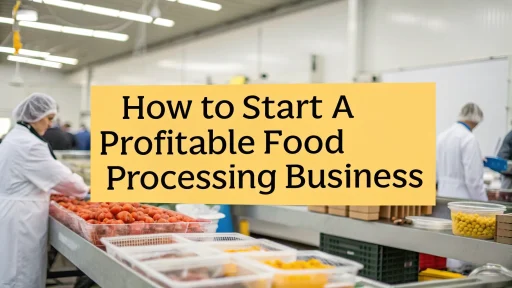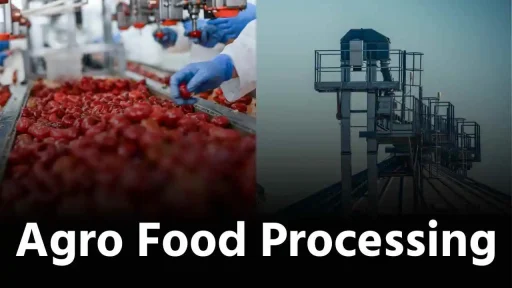India’s food processing industry is on the verge of significant changes. The transformation is centered around the Mega Food Parks (MFPs)—their multi-faceted approaches that are meant to change the paradigm of processing, preserving, packaging, and exporting food. With all of these changes, it comes as no surprise that these are viewed as a “gold mine” for entrepreneurs, new businesses, and investors in agriculture due to India’s growing food economy as well as the potential for exports to foreign countries.
In this blog, we will talk about the infrastructure, investment opportunities, and the current status of Mega Food Parks in India, alongside their prospective advantages for investment.
What Are Mega Food Parks?
Mega Food Parks serve as a cluster-based infrastructural system and aim to set up advanced food processing environments closer to agriculture production areas. Generally, a park comprises of the following:
- Central Processing Centre (CPC)
- Cold storage, packaging units, and logistics
- Common utilities and R&D labs
- Ready-to-use plots for food processing units
Launched under the Pradhan Mantri Kisan SAMPADA Yojana (PMKSY), this initiative has the objectives to reduce waste, increase value addition, and foster growth in exports.
Current Status of Mega Food Parks in India
According to the MoFPI Annual Report from 2023–2024, there are 41 approved Mega Food Parks throughout India. Out of these, 23 have been operationalized while the rest are undergoing various phases of implementation.
Related: 15 High Demand Food Products You Can Manufacture and Export from India
Chart: Mega Food Parks By State
| State | No. of Approved Parks |
| Maharashtra | 5 |
| Andhra Pradesh | 4 |
| Madhya Pradesh | 4 |
| Punjab | 3 |
| Uttar Pradesh | 3 |
| Odisha | 3 |
| Other States (Combined) | 19 |
| Total | 41 |
Market Opportunities in the Food Processing Industry in India
India’s food processing industry has been consistently expanding, averaging an annual growth of 5.35% from 2015 to 2023, outpacing agriculture’s growth of 4.46%.
| Indicator | 2022–23 |
| GVA (Food Processing Industry) | ₹1.92 lakh crore |
| Share in Manufacturing GVA | 7.66% |
| Share in Agriculture GVA | 8.45% |
| Registered Workforce | 20.68 lakh |
| Unregistered Workforce | 51.11 lakh |
| Total Agri-Food Exports | USD 46.43 Billion |
| Processed Food Export Share | 23.4% of agri-food exports |
Key Takeaway:
India’s food economy remains massive—and it is expanding. Investing in Mega Food Parks is one way to participate in this growth.
Where to Invest: Leading States for Mega Food Parks
1. Maharashtra
- Number of Parks: 5
- Reason for Investment: Leading agri-export state in India, great infrastructure and logistics, strong horticultural output including grapes, mangoes, and pomegranates.
2. Andhra Pradesh
- Number of Parks: 4
- Reason for Investment: Strong for marine exports, aquaculture, and infrastructure.
3. Madhya Pradesh
- Number of Parks: 4
- Why Invest: Leading in wheat, pulses and oilseeds production. Agro-rich zones like Indore and Bhopal draw fast-moving consumer goods companies.
4. Punjab
- Number of Parks: 3
- Why Invest: Leading in wheat and dairy with modern mandis, strong agri R&D.
5. Odisha
- Number of Parks: 3
- Why Invest: Emphasis on tribal products and millet processing along with government support under ODOP.
6. Uttar Pradesh
- Number of Parks: 3
- Why Invest: Highest in sugarcane, milk, and mangoes production. Good policy support and access to Northern India markets.
Components of a Mega Food Park
The MFPs cover an area of 50–100 acres each and have been designed in a hub-and-spoke model.
| Component | Description |
| Central Processing Center | Core infrastructure like the cold chain, QA labs, and power supply |
| Primary Processing Centers | Near the farms to process crops for cleaning and grading |
| Collection Centers | Aggregation with weighing, storage, ICT facilities |
| Warehousing & Logistics | Integrated supply chain network |
| Common Facilities | Laboratory and packaging, water treatment, and other common facilities |
Benefits for Entrepreneurs & Young Startups
- Plug-and-Play Infrastructure
Ready plots reduce the cost and time for setting up units. - Subsidies & Grants
Sponsored grants of 50% up to ₹50 Cr under PMKSY. - Clustered Ecosystem
Access to raw and semi-finished materials, utilities, and skilled manpower. - Reduced Wastage
Cold chain and processing systems help minimize post-harvest losses. - Export Boost
Parks help meet international standards via in-house quality labs.
What Can Be Manufactured in Mega Food Parks?
| Category | Examples of Units |
| Fruits & Vegetables | Pulp extraction, juice, frozen foods, pickles |
| Dairy | Milk chilling, cheese, paneer, milk powder |
| Grains & Cereals | Flour mills, RTE breakfast foods, bakery items |
| Meat & Fish | Slaughter units, cold storage, seafood processing |
| Beverages | Juice, energy drinks, functional beverages |
| Ready-to-Eat Foods | Packaged snacks, curries, health bars |
Government Support & Policy Incentives
Under PMKSY, MoFPI provides:
- Capital Grants: Up to ₹50 crore for eligible developers
- 50% Subsidy for common infrastructure development
- Priority Sector Lending for loans
- 100% FDI via automatic route
Additional Support:
- Participation in World Food India events
- Investor matchmaking via Nivesh Bandhu Portal
- Assistance in certification (FSSAI, HACCP, BRC, ISO)
Related: Top 10 Government Schemes for Food Processing Startups in India
NPCS: Your Partner for Food Park Project Reports
At Niir Project Consultancy Services (NPCS), we specialize in preparing:
- Market Survey cum Detailed Techno-Economic Feasibility Reports
- Reports include raw material sourcing, plant layout, machinery, and financials
- We help entrepreneurs assess feasibility and successfully plan new industrial ventures
Whether you’re planning to set up a spice processing unit, a dairy plant, or a ready-to-eat food facility within a Mega Food Park, NPCS can assist you in starting with a strategic blueprint.
Challenges to Keep in Mind
| Challenge | Suggested Mitigation |
| Land acquisition delays | Partner with existing MFP developers |
| Last-mile connectivity issues | Leverage PM GatiShakti logistics planning |
| Low awareness among startups | Use MoFPI’s Nivesh Bandhu and incubation support |
| Certification hurdles | Partner with testing labs inside parks |
For more information check our related videos on Food Processing
The Road Ahead: Forecast & Growth
- Urbanization and a growing middle class
- Increased export opportunities with Gulf, ASEAN, and African countries
- Change in eating preferences, leading to a demand for packaged and ready-to-eat foods
Focusing on Mega Food Parks today allows participating in India’s projected export-led, value-added food surge by 2030.
Conclusion: Now’s The Time to Invest
Mega Food Parks are more than just industrial clusters: they serve as catalysts for rural transformation, value addition in agriculture, and global competitiveness.
For emerging entrepreneurs and startups, these hubs offer unparalleled benefits:
- Infrastructure provided by the government
- Availability of raw materials
- Skilled labor
- A favorable ecosystem for exports and investments
With India’s agri-food exports crossing $46 billion and exports of processed foods increasing year on year, now is the time to make a tactical investment.
From healthy snacks and gourmet condiments to dairy alternatives and frozen meals, the scope of production is vast—and Mega Food Parks have the capacity, infrastructure, and aid to enable quick expansion and large-scale exports.

